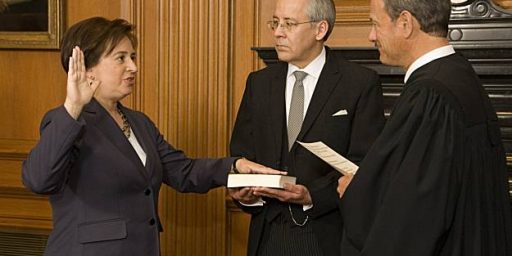Imperial Presidency Has Long History
National Journal‘s Paul Starobin examines the long history of the so-called “Imperial Presidency” in an essay for Government Executive.
The birth and sustained growth of the Imperial Presidency are inseparable from America’s self-adopted “world responsibilities,” in the apt phrase of Harry Truman. “In one generation, we’ve come from an isolated republic, to the position of the leadership of the world,” Truman declared a few months into the Korean War, which began without congressional authorization in June 1950. The American Age ushered in a new kind of presidency, designed to anticipate and, if need be, respond to threats from virtually anywhere on the globe.
Like all institutions created by the human hand, the Imperial Presidency is a work in progress. It is foremost the combined creation of the men who have held the presidential reins over the last six decades. The construction is despised by pro-Congress legal scholars and historians as well as by civil-liberties activists. But it is not, as critics sometimes suggest, an un-American creation. The modern architects have been working off a blueprint, or at least notes, supplied by no less a Founder than Alexander Hamilton, who clashed with Thomas Jefferson and (later) James Madison in his determination to establish a strong central government led by a robust executive.
[…]
[N]o one should underestimate the ability of presidents to set, unilaterally, by fiat, precedents that broaden the sweep of America’s national security commitments. In the wake of recent menacing statements from Iran against Israel, Bush appeared to do just that. “You bet we’ll defend Israel,” he said on being asked by Reuters whether America would militarily assist the Jewish state in case of attack. No president has ever been that explicit about a pledge to protect Israel; Congress has never been asked to approve a treaty commitment of that sort.
Debate over the Imperial Presidency tends to get diverted by complex questions of constitutional law on which the experts, who are themselves not devoid of political ideologies, disagree and probably always will. Both critics and advocates of the institution should have to set forth and defend their vision of America’s position in the world.
After all, the core, underlying reason that America has come to have an Imperial Presidency is not because of the essays of Alexander Hamilton and not because of a modern tendency to have strong-willed presidents, acquiescent Congresses, and deferential courts. It is because America has an Imperium.
The extent to which “America has an Imperium” is debatable, although Robert Kagan made a reasonable argument to that effect years ago. Regardless, the Constitutional powers assigned to the president in domestic affairs pale as compared those assigned Congress. For most of our history, domestic affairs dominated. Ergo, Congress dominated. Once America became a world power, let alone a superpower, those poles reversed.
Elsewhere:
- James Joyner, “Real Power Is Something You Take,” TCS Daily, January 11, 2006.
Robert Kagan, “The Benevolent Empire,” Foreign Policy, Summer 1998.






It is ironic that civil liberties activists would oppose foreign action taken by the President, when civil liberties are precisely what we’re protecting.
Throughout history, the choices have remained the same: international involvement or isolation. Modern transportation and communication has made the world much smaller, and isolationism even more difficult. So that leaves us pretty much where we are now.
I fail to see what’s wrong with admitting to have Israel’s back. We all knew it was a fact before, it was just hidden under touchy-feely diplomacy. We live in a time now where it is a great deterrent for the agressors to know if they mess with Israel, they will have the full force of the U.S. military in retaliation.
Yeah, people like Hamilton, Lincoln, etc. have pushed the envelope of checks and balances on the Executive.
The difference is: they were competent. Bush is not.